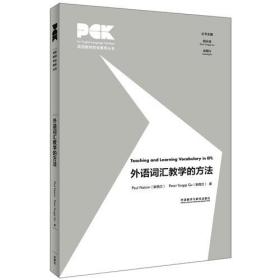
外语词汇教学的方法
全新正版 现货速发
¥ 17.3 5.1折 ¥ 34 全新
库存15件
江苏无锡
认证卖家担保交易快速发货售后保障
作者(新西兰)保罗·内申(Paul Nation),(新西兰)顾永琦Peter Yongqi Gu
出版社外语教学与研究出版社
ISBN9787521308211
出版时间2019-04
装帧平装
开本16开
定价34元
货号1201871976
上书时间2024-10-27
- 在售商品 暂无
- 平均发货时间 9小时
- 好评率 暂无
- 最新上架
商品详情
- 品相描述:全新
- 商品描述
-
目录
CHAPTER ONE VOCABULARY LEVELS AND KNOWING A WORD
Introduction 3
The five levels of vocabulary 3
Vocabulary as a barrier to understanding 10
Knowing and learning a word 11
*Summary 16
*What should a teacher do after reading this chapter? 16
*References 16
*Further reading 17
CHAPTER TWO HOW VOCABULARY IS LEARNED
Introduction 21
Quantity and quality of learning 21
Quantity of meetings (repetition) 21
How can we increase repetition in a course? 25
Quality of meetings 27
How can we increase the quality of meetings? 31
Repetition and quality of processing 33
Vocabulary learning and the four strands 35
*Summary 37
*What should a teacher do after reading this chapter? 37
*References 38
*Further reading 39
CHAPTER THREE PLANNING FOR VOCABULARY IN LANGUAGE PROGRAMMES
What vocabulary should a teacher focus on? 43
The four strands 45
Planning for high frequency words 50
Planning for mid- and low frequency words 54
Planning a vocabulary programme and putting it into action 55
*Summary 58
*What should a teacher do after reading this chapter? 58
*References 58
*Further reading 59
CHAPTER FOUR VOCABULARY AND THE RECEPTIVE SKILLS OF LISTENING AND READING
Vocabulary and listening 63
Vocabulary and reading 64
Learning vocabulary through listening and reading 65
Running an extensive reading programme 68
Useful deliberate learning 78
Fluency development 79
*Summary 80
*What should a teacher do after reading this chapter? 80
*References 81
*Further reading 82
CHAPTER FIVE VOCABULARY AND THE PRODUCTIVE SKILLS OF SPEAKING AND WRITING
Vocabulary and speaking and writing 85
Learning vocabulary through speaking and writing 85
Coping with difficult speaking and writing tasks 91
Useful deliberate learning 99
Fluency development 101
Developing the writing skill 103
*Summary 106
*What should a teacher do after reading this chapter? 106
*References 107
*Further reading 108
CHAPTER SIX LEARNER STRATEGIES IN VOCABULARY LEARNING
Introduction 111
Learner strategies and vocabulary development 111
The vocabulary learning task 112
Strategies for different stages of vocabulary learning 116
Learner self-management in vocabulary learning 125
Developing learner autonomy 127
*Summary 127
*What should a teacher do after reading this chapter? 128
*References 128
*Further reading 131
CHAPTER SEVEN MEASURING VOCABULARY KNOWLEDGE
Vocabulary size 135
Measuring vocabulary size 146
Measuring spe purposes vocabulary 148
Measuring vocabulary in use in writing 149
Small scale tests of vocabulary 152
The validity of test items 156
*Summary 157
*What should a teacher do after reading this chapter? 157
*References 158
*Further reading 160
CHAPTER EIGHT INVESTIGATING VOCABULARY
Introduction 163
What is a word? 163
Understanding the statistical nature of vocabulary 166
Analysing texts to see their vocabulary difficulty 169
Gathering information on individual words 176
*Summary 179
*What should a teacher do after reading this chapter? 179
*References 180
*Further reading 181
CHAPTER NINE COMMON QUESTIONS ABOUT VOCABULARY
Introduction 185
1 Should translation be used to teach and learn vocabulary? 185
2 Should words be learned in context? 187
3 What should a teacher do about collocations? 189
4 Do the relationships between words in a content-based unit of work help learning? 193
5 How big a vocabulary do you need? 196
6 How should words be taught? 201
7 Is an English through the curriculum course a good environment for learning vocabulary? 203
8 Should teachers give learners lists of words to learn? 206
9 Should learners use monolingual or bilingual dictionaries? 208
10 What are the most effective improvements that a teacher could make to a course in English as a foreign language? 211
Appendices
APPENDIX 1: A GUIDE TO THE VOCABULARY LEVELS TESTS 215
APPENDIX 2: GLOSSARY 226
APPENDIX 3: LIST OF WEBSITES MENTIONED IN THE BOOK 229
内容摘要
英语学习者需要了解哪些词汇?
英语词汇到底该怎么教?使用翻译法?语境猜测法?查阅词典法?
课外阅读对于词汇学习有什么作用?
学习者的词汇知识如何衡量评估?
……
《外语词汇教学的方法》作者保罗·内申教授和顾永琦教授依据国内外词汇学习理论,对英语词汇教学中的一些关键问题进行阐释,不仅厘清了词汇教学中的常见错误认识,还提供了大量课堂活动案例,是专为中小学英语教师及立志从教的英语专业高年级学生打造的一本实践性词汇教学用书。
相关推荐
— 没有更多了 —


















以下为对购买帮助不大的评价